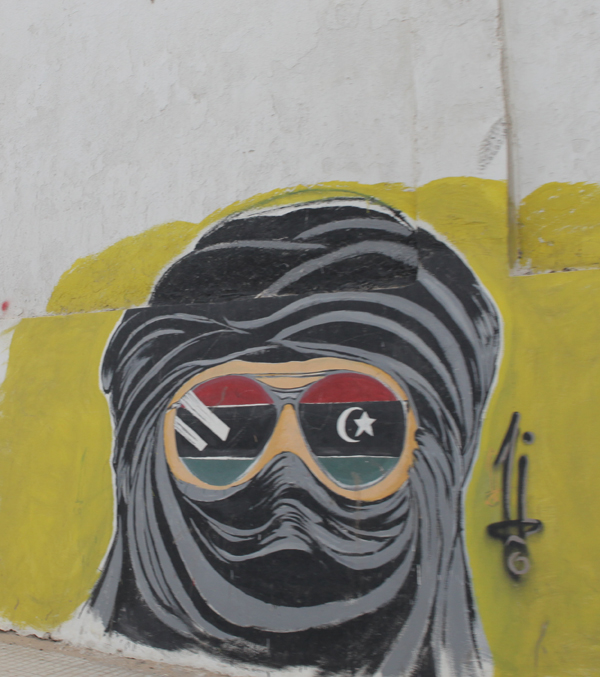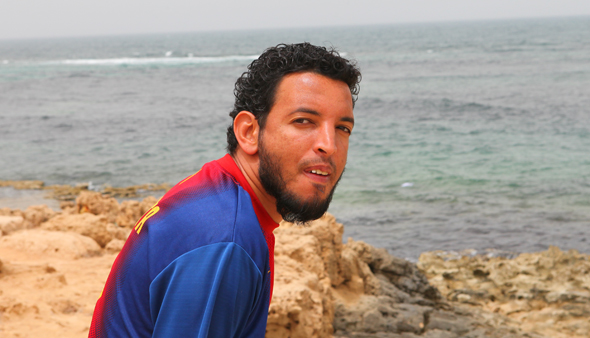Economic Recovery in Libya
Libya Top Stories
Economic Recovery in Libya
Given recent headlines, no one can now deny that Libya has been undergoing a complex transition that is hampered by the proliferation of armed groups with a multiplicity of political, economic, religious, regional, and ideological goals and objectives.
Economic recovery in Libya – Thoughts about social and economic reintegration of armed groups
By Hafed Al-Ghwell.
Washington DC
Given recent headlines, no one can now deny that Libya has been undergoing a complex transition that is hampered by the proliferation of armed groups with a multiplicity of political, economic, religious, regional, and ideological goals and objectives.
Although the overall balance moved from a budget deficit of 18.7% of GDP in 2011 to a surplus of 24.0% of GDP in 2012 with the restoration of hydrocarbon output, the fiscal breakeven price of oil rose from US$ 67 per barrel in 2010 to US$ 74 in 2012.
Coming up with concrete programs during the transitional phase to address the most pressing challenges facing the country, like developing disarmament, demobilization, and reintegration programs (DDR) for the armed groups of young people who fought during the war of 2011, requires an understanding of key social and political stakeholders, their expectations, incentives, and their capabilities. In addition, of course, to some understanding of international experience from other parts of the world that have gone through similar circumstances and which can shine a light on what works and what does not.
This article tries to explain in brief the context for social and economic reintegration in Libya, offer some key lessons from around the world, and makes some brief recommendations, only as examples, for what kind of programs can be perused by the Libyan government very quickly and cost effectively in the short term.
Background:
The end of Qadafi’s regime has led to a situation where security is highly fragmented. Multiple groups believe that they contributed significantly to the ousting of the former regime and have legitimacy to continue functioning. This situation has occurred, of course, because the uprising in the country was highly decentralized. Many armed groups do not see themselves as serving a central authority, and in fact have separate procedures to register members and weapons, as well as to arrest and detain suspects. Groups in the east and west of the country were often structured differently, had multiple and separate chains of command and objectives.
Effective decision making and service provision has also been taking place at the level of local councils since the start of the revolution. From the local perspective, there is a resistance to (re) centralizing power, especially in light of the perceived inability of the authorities to put forward a strategy to address current needs. It is also likely that a portion of the population who supported the previous regime is opposed to activities led by the new, central and local, authorities. Therefore, any effective DDR programs need to happen at local level. Moreover, a political settlement is a likely precondition for many development activities.
It is now too obvious,that there is an urgent need for disarmament and demobilization of the armed groups scattered around the country, and plans are being perused by the government that would enable former fighters to join the police, military, or civil service in exchange for laying down their arms. Efforts towards integrating all of these groups into the military or police need first to consider existing grievances that fighters may have against each other.
Given the perceived lack of legitimacy of the authorities in the eyes of many of these groups, the large numbers of armed young men, and the lack of reconciliation efforts, few have so far, or are likely to agree to disarm. Moreover, and more dangerously in this context of instability, young armed men are developing increasing economic incentives to hold on to weapons given opportunities to provide private security or involve themselves in criminal activity.
Reintegration Experiences: Lessons for Libya
Reintegration is often a part of larger disarmament, demobilization and reintegration (DDR) programs. The reintegration aspect usually includes economic reintegration activities such as cash benefits, skills training, and/or priority selection for certain types of jobs.
1. Economic reintegration efforts have been largely unsuccessful because of a lack of attention to labor markets and to the existing behavioral, cognitive and technical skills of target groups. Economic reintegration often focuses on short-term provision of jobs or short-term skills development activities. These short-term activities are not often linked to the needs of the market or to the capacities or interests of youth. In the case of Libya, it is also particularly important to note that DDR often takes place after lengthy wars, where armed groups have become a source of livelihood and identity for fighters. In these cases, DDR focuses on providing alternative sources of livelihood for those who do not know another way of life. However, this is unlikely to be the case for most fighters in Libya. The former occupations or activities of fighters need to be considered when designing economic reintegration activities, as well as the overall work aspirations among young Libyans.
2. It is essential to consider the expectations of participants when designing reintegration activities. Unlike other conflict-affected countries, Libya has a vast amount of resources and a relatively small population. With approximately 6 million people and a GDP per capita of approximately $17,000, many Libyans believe their country ‘ought to resemble Dubai. Libya has a high rate of literacy (88.4%) and high gross primary, secondary and tertiary enrollment rates (94.1%), though the quality of education is extremely low. This raises job expectations among youth without the necessary skills. Most Libyans expect employment to be provided by the government, but there is a growing disposition towards entrepreneurship following the revolution. Immigrants have in the past done most skilled or manual labor from the African continent, and North Africa (i.e. Egypt and Tunisia). Young Libyans have not expressed an interest in becoming skilled laborers, as these activities not give individuals any ‘status’ in their community. Rather, they are looking to upgrade their skills in order to secure better quality jobs that they see as being on the horizon.
3. The assumption that social reintegration happens as a result of economic reintegration is often false. Recent World Bank research in Burundi, for example, shows that beneficiaries did benefit economically from the program, but this did not result into greater political and social integration.
4. The evidence that exists on social reintegration shows that the process requires thinking through the divisions in communities and how to address them. The ex-post evaluation of a USAID funded program in Liberia showed success in achieving social reintegration by providing life-skills education for youth, helping them to understand the role of youth in the community and finding ways to engage youth in community activities and decision-making. The project made a conscious effort to promote positive interactions between community members, helping to re-establish trust after the war. Lessons were spread throughout the country, for example through youth-led community radio activities.
Psycho-social programming is needed for successful reintegration when individuals suffered extensive trauma. Research in Sierra Leone shows that an individual’s prospect of gaining acceptance from family and neighbors depend largely on the abusiveness of the unit in which he or she fought.
5. Psycho-social programming is needed for successful reintegration when individuals suffered extensive trauma. Research in Sierra Leone shows that an individual’s prospect of gaining acceptance from family and neighbors depend largely on the abusiveness of the unit in which he or she fought. Public works programs and presence of troops had no effects on individual prospects of reintegration in this study.
6. It is important to include middle and high-ranking officers in reintegration efforts. Former fighters are likely to remain organized and in many cases are likely to follow instructions of commanders. It is therefore important to involve former fighters of all ranks in consultations in the design of activities. There is evidence that middle and high ranking officers are more likely than lower ranking individuals to participate in the illicit economy after a war. These links are evident in several countries, including Mozambique, Nigeria, Cambodia, and Colombia. Ensuring that the needs and aspirations of middle and high ranking officers are met could help mitigate this risk.
7. Most experts recognize the importance of integrated approaches that include not only former fighters but also the wider community. This approach seems to minimize the perception that fighters are unduly benefitting from war and also increases ties between fighters and the communities where they live. This type of programming also ensures that community-members and community leaders have greater buy-in and that projects benefit a larger group of people. Restricting programming to former combatants also runs the risk of alienating those who were affected by war and did not fight. Community-based, integrated approaches help reduce the problems with targeting.
8. There is a need to manage expectations of what can be achieved. Although programming can be designed to manage expectations, communications and information campaigns also need to be designed with the purpose of managing expectations. Employment initiatives, in particular, raise expectations a great deal. Ensuring that individuals have information on who will have access, how they will gain access, and how long employment will last (or how secure employment will be) is essential.
Potential programming options
Taking into consideration the lessons outlined above and the current context in Libya, an integrated, community-led approach including former fighters and non-fighters seems likely to succeed. This approach would need to engage participants in a process to design a menu of activities based on aspirations of individuals and the needs of communities.
These would include:
Community participation and service:
It is important to remember that much of the “Arab Spring” took place out of demands for greater participation in decision-making and to stop government abuse, and created a momentum for civic participation. Encouraging community participation and service could further help to increase access to local decision-making by young stakeholders, including former combatants.
To provide incentives for participation, some of the community service could be attractive to former combatants and other youth categories who would receive conditional cash transfers. This kind of program would substitute for more common cash-for-works initiatives (workfares), which often assume an unskilled workforce with limited aspirations, and would provide specific opportunities to develop job relevant skills through a variety of youth-led initiatives, while offering good incentives for disarmament and demobilization.
Taking into consideration the lessons outlined above and the current context in Libya, an integrated, community-led approach including former fighters and non-fighters seems likely to succeed.
More broadly, this program would reinforce the grassroots civil society that emerged in the context of the revolution and help improve its capacity. Depending on local needs, activities could include street and public space cleaning and rehabilitation, rehabilitation of community/youth spaces and potential facilities for ICT, soft skills and other trainings, as well recreational activities, community radios, debates, and psycho-social support services, etc. Gender sensitive activities should be carefully tailored also to ensure inclusion of young women given the conservative nature of Libyan society.
While the core of the program would be based on local/community driven demands, this type of service may include a sub-window aimed at supporting exchanges between youth from different parts of Libya to work cooperatively on projects in communities other than their own. This will have added value for building reconciliation and social cohesion across the country. This service could be implemented by local NGOs in partnership with local administrative councils.
Economic reintegration:
Economic reintegration activities in Libya need to be tailored to skills and aspirations of the particular groups, while engaging private sector actors. At the moment, local private sector is very weak because of the legacy of the former regime restrictions. However, there is an emergent group of young, civically-minded entrepreneurs and business associations with which to engage. In this environment, it is important also to promote opportunities for self-employment and youth entrepreneurship. This could be linked to additional activities for incubation and business development services, investment support and access to credit. It will be critical to have partnerships with the local and international private sector early on to leverage their expertise and creating the enabling environment for small private sector development.
As to employability skills training, a recent consultation with young representatives in Benghazi highlighted the high demand for English language skills, ICT skills and business development training. Job counseling and job readiness (interviews skills, preparation of CV, etc) was also expressed as an immediate need, as youth understand the future importance of the private sector in the Libyan economy but feel ill-prepared for engaging with the private sector as they seek out work opportunities.
For a number of social and cultural reasons, Arab youth show a good fit with all jobs and activities related to the ICT sector. ICT can provide opportunities for people of different skills degrees, in particular via capturing opportunities emerging from micro-work which requires low skills and can be performed remotely. Micro-work refers to the break-up of larger projects into smaller tasks that can be completed using the internet. Most common forms of micro-work include market research, data entry, data verification, copywriting, graphic design and software development. This type of ICT work has the added value of being socially acceptable for young women or providing opportunities for home-based work.
Job-matching through mobile applications allows for overcoming barriers like timing of accessing the information. Employers can register in a mobile-based system and post vacancies. Job seekers can upload mini-CVs indicating key words that can be matched with ads posted by employers and they can quickly respond through SMS messages. Souktel is a successful example of such job-matching technology. Developed in Palestine, Souktel now covers several Arab countries, and applications could readily be developed for Libya.
Life skills and psychosocial activities may be offered under the Community participation and service program or in a self-standing manner. The newest international evidence shows that “life skills”, also referred to as “soft” skills, are a necessary complement to hard/technical skills for successful labor outcomes.
Life skills include:
(i) emotional coping skills (including managing feelings and stress, self monitoring);
(ii) cognitive skills (such as decision making and problem solving, critical thinking, setting goals, prioritizing and organizing complex information) and social and inter-personal skills (including communication, negotiation, leadership, conflict management, etc.).
Psycho-social support may also be especially tailored to the identified former combatants and other specific groups. Psycho-social activities could include individual or group counseling, as well as life skills. At any rate, it would be critical to ensure for non governmental and private provision of the various trainings and services, even if they are covered through public funding.
The point of this brief outline is simply to point out that Libya can learn a great deal about how to over-come this challenge from many other countries that have experienced similar, if not far worst, post-conflict, transitions. Libya must, indeed, deal with this issue urgently and remove it from becoming yet as another obstacle in front of its, already delayed, transition. The more delay in dealing with this difficult task, the more complicated and more wide-spread its negative consequences will be to deal with.
Hafed Al-Ghwell is an Advisor to the Dean of the Board of Executive Directors of the World Bank Group.
